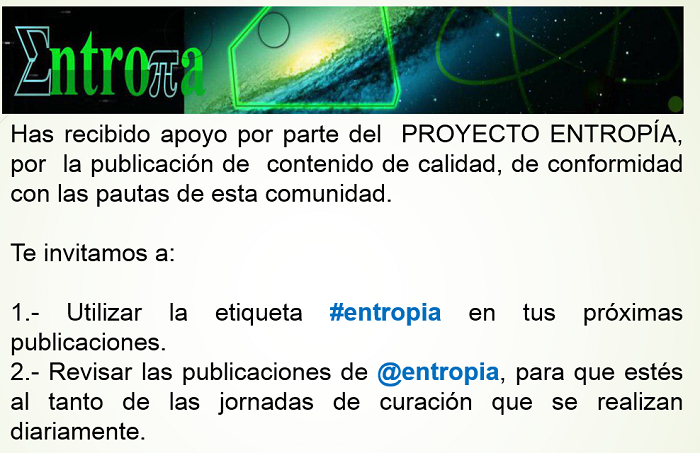Puedes leerlo aquí, o simplemente desplázate hacia abajo en la página.

What if I told you that everything is already written? That any work of literature, past or future, can be found on the internet? From the cure for any disease to the most accurate physical theory? The dream you will have next Tuesday? If you are familiar with the story by Argentine writer Jorge Luis Borges, you will undoubtedly be interested in learning about The Library of Babel, a digital project inspired by this work and bearing the same name. Since its release in a distant 1941, Borges's story introduced us to an infinite library composed of all possible combinations of letters and symbols, creating every imaginable book, from great classics to incomprehensible works. This idea, which holds a deep philosophical sentiment, explores the nature of knowledge, the search for meaning, and the infinite. And surely, entering the Library of Babel website gives us a terrifying and strange idea of the dimension of knowledge, probabilities, and makes us feel incredibly minuscule before an endless amount of unreadable material accompanied by possible hits.
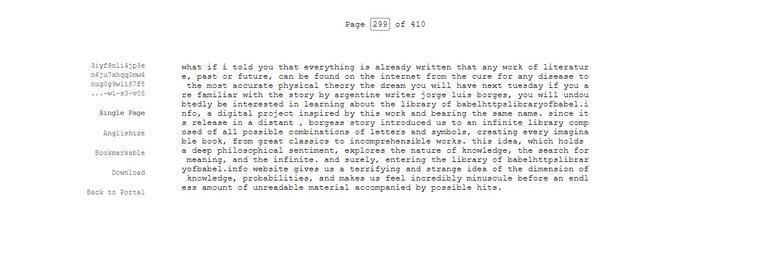
In the story, the library contains all the knowledge of the universe, but at the same time, it is a chaotic place where finding a comprehensible book is a titanic task. The term "Babel" also evokes the biblical Tower of Babel, a symbol of diversity and linguistic confusion. Just entering a shelf at random and reading some page, we find an endless series of random characters, clustered without any sense, perhaps some readable word but nothing more. The frustration of not finding what we are looking for, of not having the luck to open a book with the answers we want, with something that surprises us, is extremely great.
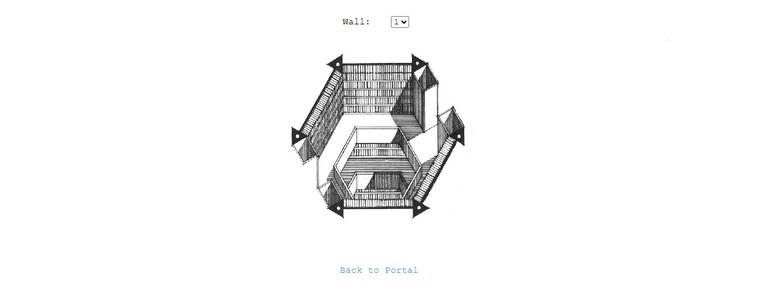
The theory behind the Library of Babel is based on the mathematical concept of combinations and permutations. We have a finite set of characters (such as the alphabet) combined in all possible ways in books of a given length. Thus, it is possible to create a "universe" of books containing all possible combinations of those characters. This includes both coherent literary works and nonsensical text.
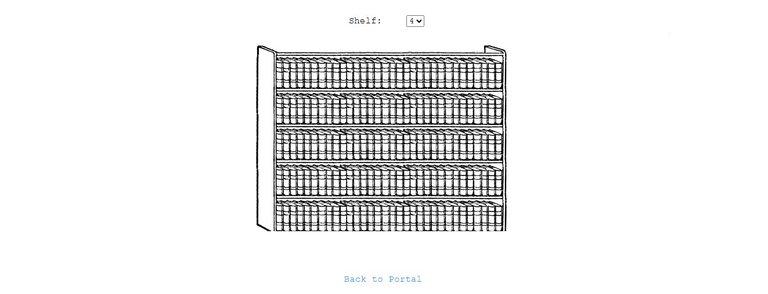
The web project "The Library of Babel" was created by Jonathan Basile, an American writer and developer. Basile was inspired by Borges's story and decided to bring the idea to the digital world, creating a website where this infinite library can be explored, surprising us with its minimalist style and characters simulating a typewriter. A web with beauty and aesthetics from another era, but which for many is tremendously useless. His goal was undoubtedly not only to pay tribute to Borges but also to provide a platform to reflect on the nature of knowledge and access to information. And here we are in the middle of those pages, with all the knowledge in the world but not knowing how to find it, without a clue where to find it.
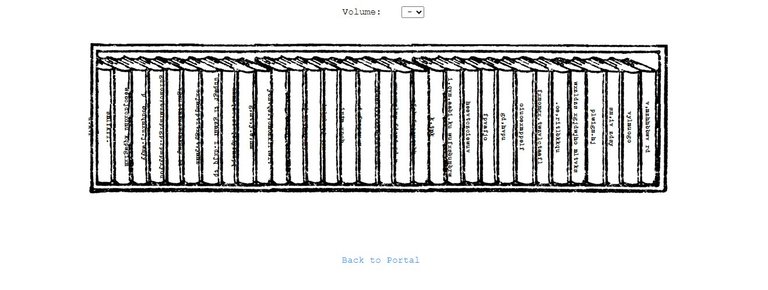
And even though we can navigate this immense library, searching for specific books and exploring randomly generated volumes, it is impossible to escape the chaos. Although the library is digital and, therefore, not truly infinite in the physical sense, the scale of possibilities is so vast that it simulates the feeling of infinitude that overwhelms us and, if we think too much about it, scares us. It is not only a tribute to Borges's imagination but also a tool to reflect on information overload in the digital age, inviting us to consider the abundance of data surrounding us and how we filter and make sense of this information to find what truly has value. A fascinating experiment that leads us to question the meaning of knowledge and information in an apparently infinite universe. It is a testament to the power of literature and technology to expand our horizons and challenge our understanding of the world.

I sincerely want to thank you for taking the time to read this article. Your support means a lot to me and motivates me to continue sharing content that can be useful and interesting for you. If you found this article helpful or enjoyed reading it, I would greatly appreciate your feedback. Best wishes.
Un Universo Infinito de Conocimiento

¿Y si te dijera que todo ya está escrito? ¿Que cualquier obra de literatura pasada o futura se encuentra en internet? ¿Desde la cura a cualquier enfermedad hasta la teoría física más acertada? ¿El sueño que tendrás el martes de la próxima semana? Si estás familiarizado con el cuento del escritor argentino Jorge Luis Borges, sin dudas te interesará conocer La Biblioteca de Babel, un proyecto digital inspirado en esta obra y de igual nombre. Desde su salida en un lejano 1941, el cuento de Borges nos presentaba una biblioteca infinita compuesta por todas las posibles combinaciones de letras y símbolos, creando cada libro imaginable, desde los grandes clásicos hasta obras incomprensibles. Esta idea, que encierra un profundo sentimiento filosófico, explora la naturaleza del conocimiento, la búsqueda del significado y el infinito. Y sin duda, entrar en la página La Biblioteca de Babel nos da una idea aterradora y extraña de la dimensión del conocimiento, las probabilidades, y hace que nos sintamos increíblemente minúsculos ante un sinfín de material, ilegible acompañado de posibles aciertos.
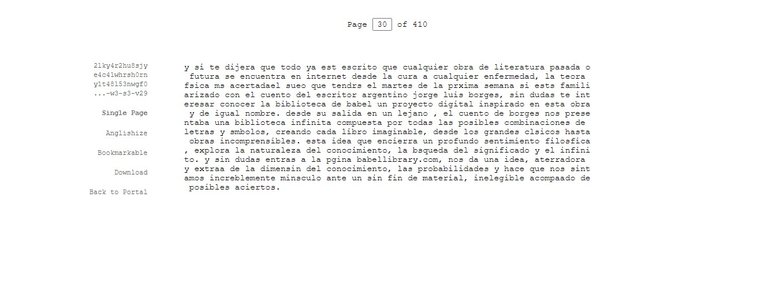
En el cuento, la biblioteca contiene todo el conocimiento del universo, pero al mismo tiempo, es un lugar caótico donde encontrar un libro comprensible es una tarea titánica. El término "Babel" también evoca la Torre de Babel bíblica, símbolo de la diversidad y la confusión lingüística. Basta con entrar a un estante al azar y leer alguna página, y nos encontramos con un sinfín de caracteres aleatorios, aglutinados sin el mínimo sentido, quizás alguna que otra palabra legible, pero no más allá. La impotencia de no encontrar lo que buscamos, de no tener la suerte de abrir un libro con las respuestas que queremos, con algo que nos sorprenda, es extremadamente grande.

La teoría detrás de la Biblioteca de Babel se basa en el concepto matemático de combinaciones y permutaciones. Tenemos un conjunto finito de caracteres (como el alfabeto) y se combinan de todas las formas posibles en libros de una longitud dada. Así, se puede crear un "universo" de libros que contienen todas las posibles combinaciones de esos caracteres. Esto incluye tanto obras literarias coherentes como textos sin sentido.

El proyecto web "La Biblioteca de Babel" fue creado por Jonathan Basile, un escritor y desarrollador estadounidense. Basile se inspiró en el cuento de Borges y decidió llevar la idea al mundo digital, creando un sitio web donde se puede explorar esta biblioteca infinita, que nos sorprende con su estilo minimalista y caracteres que simulan una máquina de escribir. Una web con belleza y estética de otra época, pero que para muchos resulta tremendamente inútil. Su objetivo, sin dudas, no fue solo rendir homenaje a Borges, sino también proporcionar una plataforma para reflexionar sobre la naturaleza del conocimiento y el acceso a la información. Y aquí estamos nosotros en el medio de esas páginas, con todo el conocimiento del mundo, pero sin saber encontrarlo, sin una pista de dónde encontrarlo.

Y es que, aunque podamos navegar por esta inmensa biblioteca, buscando libros específicos y explorando volúmenes generados al azar, es imposible escapar del caos. Aunque la biblioteca es digital y, por lo tanto, no verdaderamente infinita en el sentido físico, la escala de posibilidades es tan vasta que simula la sensación de infinitud que nos abruma y, si nos ponemos a pensar mucho en ella, nos asusta. No solo es un homenaje a la imaginación de Borges, sino también una herramienta para reflexionar sobre la sobrecarga de información en la era digital, que nos invita a considerar la abundancia de datos que nos rodea y cómo filtramos y damos sentido a esta información para encontrar lo que verdaderamente tiene valor. Un fascinante experimento que nos lleva a cuestionar el significado del conocimiento y la información en un universo aparentemente infinito. Es un testimonio del poder de la literatura y la tecnología para expandir nuestros horizontes y desafiar nuestra comprensión del mundo.

Quiero agradecerles sinceramente por tomarse el tiempo de leer este artículo. Su apoyo significa mucho para mí y me motiva a seguir compartiendo contenido que pueda ser útil e interesante para ustedes. Si encontraron este artículo útil o disfrutaron leyéndolo, les agradecería enormemente sus comentarios. Éxitos.

| I’m Ernesto, a Cuban passionate about art and writing. Always learning, always growing. Excited to share and learn more every day! I write about art, drawing, video games, nature, and review the things I like. My goal is to inspire and connect with others through my creative journey. |
|---|
Translated with DeepL.com (free version)
I apologize if there are any grammatical errors, English is not my native language, I have tried to be as careful as possible.
I regularly create images on Pixabay, which are free of copyright. Access my gallery by clicking here.
All assets, illustrations and banners have been created by me and are original content, unless otherwise specified.
The cover of this article was created using Canva.
Illustrations created using Microsoft's AI technology for illustrative purposes.
Screenshots used from the website for illustrative purposes.
